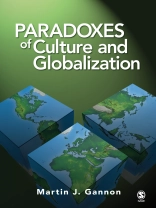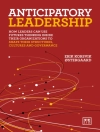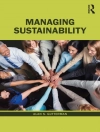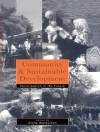‘A truly extraordinary book! The range of knowledge revealed by the author is quite astonishing and the material presented is done so in a clear and unambiguous writing style.’The book includes astonishingly varied perspectives on issues that will impact the hoped-for positive consequences of globalization. I felt I was being informed by an expert who grasps the complexity of the issues involved in ways that make them clear and useful. If I was teaching a course that had anything to do with globalization and/or culture, I would assign this book—and if I knew of someone who was being assigned to another country, I would require him or her to read this book.’
—Benjamin Schneider, Valtera Corporation and Professor Emeritus, University of Maryland
What is a paradox? Why are cross-cultural paradoxes essential for understanding the changes that are occurring because of globalization? Encompassing a wide variety of areas including leadership, cross-cultural negotiations, immigration, religion, economic development, and business strategy, Paradoxes of Culture and Globalization develops cross-cultural paradoxes essential for understanding globalization.
Key Features
- Highlights over 90 paradoxes structured in a question/discussion format to actively engage readers and provide an integrative overview of the book
- Presents key issues at a higher and integrative level of analysis to avoid stereotyping particular cultures
- Facilitates class discussions and the active involvement of class members in the learning process of culture and globalization.
- Enlarges individuals′ conceptual understanding of cross-cultural issues
- Focuses on both traditional and controversial topics including motivation and leadership across cultures, communicating and negotiating across cultures, immigration, religion, geography, economic development, business strategy, and international human resource management
Intended Audience
This is an excellent text for advanced undergraduate and graduate courses in International Management, International Business, Comparative Management, World Business Environment, Cross-Cultural Management, Cross-Cultural Communications, and Cultural Anthropology in the departments of business and management, communication, and anthropology.
Tabella dei contenuti
PREFACE: A THIRD PERSPECTIVE
1.1 PARADOXES, EDUCATION AND TRAINING
1.2 EXERCISE: INTRODUCING THE BOOK
1.3 A NOTE ON WRITING
1.4 ACKNOWLEDGEMENTS
PART 1: CONCEPTUAL FOUNDATIONS
CHAPTER 1: THINKING PARADOXICALLY
1.1 ESSENTIAL CONCEPTS
1.2 LIMITATIONS
1.3 TAKEAWAYS
1.4 DISCUSSION QUESTIONS
1.5 EXERCISES
CHAPTER 2: CONCEPTUALIZING AND PERCEIVING CULTURE
2.1 CONCEPTUALIZING CULTURE
Paradox 2.1 Why are there so many definitions of culture?
Paradox 2.2 Can there be a very large and a very small number of cultures?
Paradox 2.3 Can collectivists be self-centered and selfish?
Paradox 2.4 Value paradoxes exist in all cultures. For example, how can a national culture value freedom and dependence simultaneously?
Paradox 2.5 How are cultural values and cultural practices related?
Paradox 2.6 Does culture matter?
Paradox 2.7 Are demographics more important than culture?
Paradox 2.8 Should we advocate only one perspective on culture?
2.2 PERCEIVING CULTURE
Paradox 2.9 Do proper introductions and greetings simultaneously involve kissing, bowing, and shaking hands?
Paradox 2.10 Are cultural stereotypes valid?
Paradox 2.11 Are the distinctions between levels of culture relevant in a globalizing world?
Paradox 2.12 Do insiders understand their own cultures better than outsiders?
Paradox 2.13 Can global citizenship and the effects of root cultures exist simultaneously?
Paradox 2.14 Can cultures change quickly?
2.3 TAKEAWAYS
2.4 DISCUSSION QUESTIONS
2.5 EXERCISE: CHAPTER 1
2.6 EXERCISE AFTER EACH CHAPTER
PART 2: BEHAVIORAL ISSUES
CHAPTER 3: LEADERSHIP, MOTIVATION, AND GROUP BEHAVIOR ACROSS CULTURES
Paradox 3.1. Framing leadership: Is the essence of leadership being stuck on the horns of a dilemma?
Paradox 3.2 Who is more effective: The instrumental/visionary/transformational leader or the Headman?
Paradox 3.3 When should a leader involve subordinates in decision making?
Paradox 3.4 Can an effective leader be someone who publicly humiliates subordinates?
3.2 MOTIVATION
Paradox 3.5 Is the relationship between motivation and ability additive or multiplicative in the prediction of individual success and performance?
Paradox 3.6 Can an individually-based need hierarchy exist in a collectivistic culture?
Paradox 3.7 Do effective executives attribute success to themselves or to others?
3.3 GROUP BEHAVIOR
Paradox 3.8 Are there free riders or equally-responsible contributors in small groups?
Paradox 3.9 Do the personalities of individuals primarily reflect the influence of culture both in general and in small groups?
Paradox 3.10 Should multi-cultural groups be managed differently than single-culture groups?
3.4 TAKEAWAYS
3.5 DISCUSSION QUESTIONS
3.6 EXERCISES
3.7 ANSWERS
CHAPTER 4: COMMUNICATING ACROSS CULTURES
4.1: LANGUAGE
Paradox 4.1 How can knowing the language of another culture be a disadvantage?
Paradox 4.2 How can languages be rapidly dying while becoming more influential?
Paradox 4.3 Critical words and phrases: How can there be immediate recognition by
Paradox 4.4 Are proverbs effective descriptors of a culture?
4.2 CONTEXT AND BEYOND
Paradox 4.5 Can a culture be simultaneously monochronic and polychronic?
Paradox 4.6 Can a culture be simultaneously low-context and high-context?
4.3 SYMBOLISM
Paradox 4.5 Can a culture be simultaneously monochronic and polychronic?
Paradox 4.6 Can a culture be simultaneously low-context and high-context?
4.3 SYMBOLISM
Paradox 4.7 How can the same phenomenon represent different symbolic meanings?
Paradox 4.8 How can the same phenomenon represent different symbolic meanings?
4.4 TECHNOLOGY AND MEDIATED COMMUNICATION
Paradox 4.9 Can face-to-face communication be functionally equivalent to mediated communication, either individually or in small groups?
Paradox 4.10 Is the Internet integrating the world or creating wide differences?
Paradox 4.11 Is colonization or communitarianism winning in the battle for the Internet?
Paradox 4.12 Why is the information superhighway a poor metaphor for describing modern communication systems such as the Internet?
4.5 TAKEAWAYS
4.6 DISCUSSION QUESTIONS
4.7 EXERCISE (CRITICAL INCIDENT)
CHAPTER 5: CROSSING CULTURES
5.1 CULTURE-BASED ETHICS: RELATIVISM VERSUS UNIVERSALISM
Paradox 5.1 Are ethical norms and standards universal or relative to the situation?
5.2 GENERIC CULTURES AND ETHICS
Paradox 5.2 Are there universal ethics across generic cultures, or do ethics vary by the type of generic culture?
5.3 EXPATRIATE PARADOXES
Paradox 5.3 Is the general stereotype of the host culture valid?
Paradox 5.4 How can the Expat manager be simultaneously powerful and powerless?
Paradox 5.5 How can the Expat manager be simultaneously free of home country norms and restrained by host country norms?
Paradox 5.6 How can the Expat manager simultaneously accept the ideal cultural values of the home culture and realize that they do not exist in the home culture or only in attenuated form?
Paradox 5.7 How can the Expat manager resolve the conflict between contradictory demands of the home office and the host culture subsidiary?
Paradox 5.8 How can the Expat manager simultaneously give up some home country values and strengthen other home country values?
Paradox 5.9 Is it possible for the Expat manager to become more cosmopolitan and more idiosyncratic simultaneously?
Paradox 5.10 How can the Expat manager think well of the host culture and avoid being taken advantage of?
Paradox 5.11 How can the Expat manager be simultaneously at home anywhere in the world but fit comfortably nowhere?
5.4 UNDERSTANDING CROSS-CULTURAL INTERACTIONS VIA CULTURAL SENSEMAKING
5.5 REENTRY TO THE HOME CULTURE
5.6 TAKEAWAYS
5.7 DISCUSSION QUESTIONS
5.8 EXERCISES
5.9 ANSWERS TO THE TWO-ITEM SURVEY
CHAPTER 6: CROSS-CULTURAL NEGOTIATIONS
6.1 FUNDAMENTALS AND BEST PRACTICES
6.2 CASE STUDY: ENTERING THE CHINESE MARKET
6.3 NEGOTIATING METAPHORS
Paradox 6.1 Is chess more influential than the Chinese board game of Go for strategy and negotiation?
Paradox 6.2 Why do veteran international negotiators from one national culture frequently complain that their counterparts from a dissimilar national culture are simultaneously both very sincere and very deceptive?
Paradox 6.3 When negotiating, is it best to make the opening offer or respond to it?
6.4 TIME, FACE, AND THE YINYANG DYNAMIC
Paradox 6.4 How can time be considered as three circles (past, present, and future) as well as only one circle?
Paradox 6.5 Is the yinyang dynamic exclusively Asian?
Paradox 6.6 Is there only one type of face?
6.5 TAKEAWAYS
6.6 DISCUSSION QUESTIONS
6.7 CASE STUDY: GENERATOR AND ITS ASIAN PARTNERS
PART 3: THE BROADER CONTEXT
CHAPTER 7: MULTI-ETHNICITY, RELIGION, GEOGRAPHY, AND IMMIGRATION
7.1 MULTI-ETHNICITY
Paradox 7.1 Do multi-ethnic groups impede or facilitate the formation of national cultures?
Paradox 7.2 Is there, or will there be, a clash of civilizations?
Paradox 7.3 Can national cultures exist in a multi-ethnic and borderless world?
Paradox 7.4 Should all cultural practices be equally acceptable?
7.2 RELIGION
Paradox 7.5 Must religion be anthropomorphic?
Paradox 7.6 Does a religion necessarily require dogmas and creeds?
7.3 GEOGRAPHY
Paradox 7.7 Do geographic maps reflect cultural beliefs?
Paradox 7.8 Has “the death of distance” nullified the importance of geography?
7.4 IMMIGRATION
Paradox 7.9 Will the issue of immigration derail globalization?
Paradox 7.10 How can restricting immigration facilitate and promote it?
Paradox 7.11 Is immigration compatible with an equality matching culture?
7.5 TAKEAWAYS
7.6 DISCUSSION QUESTIONS
7.7 EXERCISES
CHAPTER 8: ECONOMIC DEVELOPMENT AND CULTURE
8.1 BACKGROUND
8.2 TRADE, DEMOCRACY, AND OPEN AND FREE MARKETS
Paradox 8.1 Are democracy and free markets opposed to one another?
Paradox 8.2 Does trust increase trade among nations? Does increased trade lead to conflict and war among nations?
8.3 CULTURE AND CHANGE
Paradox 8.3 Are institutions more important than culture for explaining economic development?
Paradox 8.4 Does economic development and globalization lead to individualism?
Paradox 8.5 Why do citizens vote for and accept stationary bandits as political leaders?
8.4 TAKEAWAYS
8.5 DISCUSSION QUESTIONS
8.6 EXERCISE
CHAPTER 9: GLOBALIZATION AND CULTURE
9.1 RISK
Paradox 9.1 Can global economic integration occur without political and cultural integration?
Paradox 9.2 Is globalization a myth?
Paradox 9.3 Is globalization an old or a new phenomenon?
9.2 UNCERTAINTY
Paradox 9.4 Is there a reasonable probability that a global financial collapse will occur and undermine globalization?
Paradox 9.5 Does globalization encourage nationalism?
Paradox 9.6 Are nations becoming more and less powerful simultaneously because of globalization?
Paradox 9.7 Can one nation dominate the global economy and political system?
Paradox 9.8 Is globalization doomed?
9.3 POLITICAL AND SOCIAL ISSUES
Paradox 9.8 Does globalization increase prosperity and inequality simultaneously?
Paradox 9.9 Who are the winners and losers in a globalizing world?
Paradox 9.10 Is increased education the anti-dote for outsourcing?
9.4 TAKEAWAYS
9.5 DISCUSSION QUESTIONS
9.6 EXERCISES
CHAPTER 10: STRATEGY, BUSINESS FUNCTIONS, AND INTERNATIONAL HUMAN RESOURCE MANAGEMENT
10.1 STRATEGY
Paradox 10.1 Is there an ideal mode for entering the global marketplace?
Paradox 10.2 Is there an ideal structure for the global firm?
Paradox 10.3 Are organizations worldwide becoming more similar?
Paradox 10.4 Is China a very large or a very small market?
10.2 BUSINESS FUNCTIONS
Paradox 10.5 Can accounting and financial systems be standardized or harmonized throughout the world?
Paradox 10. Should global advertising be tailored to each national and ethnic culture?
Paradox 10.7 Is it possible to create and operate airplane-based metropoli (the aeropolis) for efficient global logistics and transportation?
10.3 INTERNATIONAL HUMAN RESOURCE MANAGEMENT
Paradox 10.8 How can IHRM be both central and peripheral when going global?
Paradox 10.9 How should the conflict between internal pay equity and the forces of the external marketplace be resolved?
Paradox 10.10 Should multi-national corporations impose their values when going global?
Paradox 10.11 Which works best in a global firm, individual-based or group-based reward systems?
Paradox 10.12 Is the role of IHRM different from that of domestic-only HRM?
Paradox 10.13 Are HRM requirements similar throughout the globalizing world?
10.3 TAKEAWAYS
10.4 DISCUSSION QUESTIONS
10.5 EXERCISE
References
Circa l’autore
Martin J. Gannon (Ph.D., Graduate School of Business, Columbia University) is Professor Emeritus of Strategy and International Management at both the Smith School of Business, University of Maryland at College Park and the College of Business Administration, California State University San Marcos. He is a three-time recipient of the Fulbright Professorship Award (West Germany, 1981-82; Thailand, 1987; and Austria, 2017-18). His other awards include: 1) The Outstanding Educator Award, International Division, 2014, Academy of Management, the largest and best known management and teaching organization in the world; 2) the University of Maryland’s International Landmark Award for his contributions in the global area, 2003; and 3) the Lifetime Achievement Award, Who’s Who in America, 2018. See below for additional awards. Professor Gannon has been a Senior Research Fulbright Fellow in West Germany; the John F. Kennedy Foundation/Fulbright Professor at Thammasat University, Bangkok, Thailand; and the Fulbright Professor, Johannes Kepler University, Austria. He has also been a visiting professor at the London Business School, Bocconi University (Italy), University College – Dublin, the University of Lodz (Poland), Wuhan University, Chulalongkorn University (Bangkok), and the University of Kassel and Tubingen University in Germany, and has lectured at many other universities in the world. At the Smith School of Business he served as the Acting Associate Dean for Academic Affairs, Founding Director of the Center for Global Business, Chairperson of the Faculty of Management and Organization, Co-founder and Co-director of the Small Business Development Center, and the Founding Director of the College Park Scholars Program in Business, Society, and the Economy (an undergraduate living-learning community). He is the author of over 100 articles and papers as well as 13 books, some in multiple editions and translations (Korean, Spanish, and Italian). He recently completed a draft of his 20th book. See below. Professor Gannon has emphasized three overlapping areas of programmatic or in-depth research: International management and behavior; business strategy; and the contingent workforce, particularly studies of temporary help employment. Much of his work in international management and behavior is described in depth in the book, Understanding Global Cultures: Metaphorical Journeys Through 31Nations, Clusters of Nations, Continents, and Diversity, 5th Edition (Sage, May, 2012, c. 2013, 639 pages; Korean translation, Myung In Publishers, 2013). Rajnandini Pillai joined him as co-author after the 3rd edition. The 6th edition was published in 2016 and includes 34 national cultures and their corresponding 34 cultural metaphors. Although the publisher wanted a 7th edition, Professor Gannon decided to pursue other writing opportunities. In this book Gannon introduced the concept of the cultural metaphor to describe the culture of a specific nation. He defines a cultural metaphor as any institution, phenomenon or activity with which a nation’s citizens identify emotionally and/or cognitively, for example, the Swedish stuga or unadorned summer and weekend home. He then uses these metaphors and their distinctive features as frameworks to describe in depth the values and the associated business activities in each nation. The 6th and latest edition is divided into a fourteen-part framework to classify these 34 nations and their respective cultural metaphors, clusters of nations, cont












